Felipe Campelo
The Cone epsilon-Dominance: An Approach for Evolutionary Multiobjective Optimization
Jul 14, 2020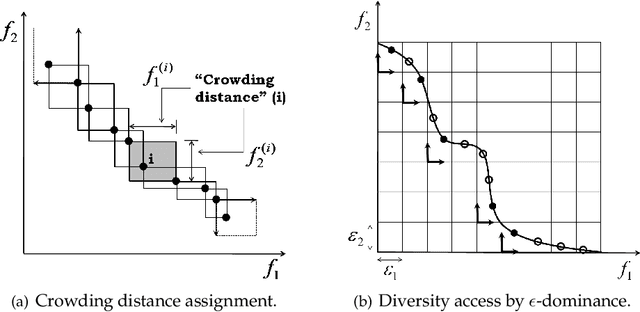
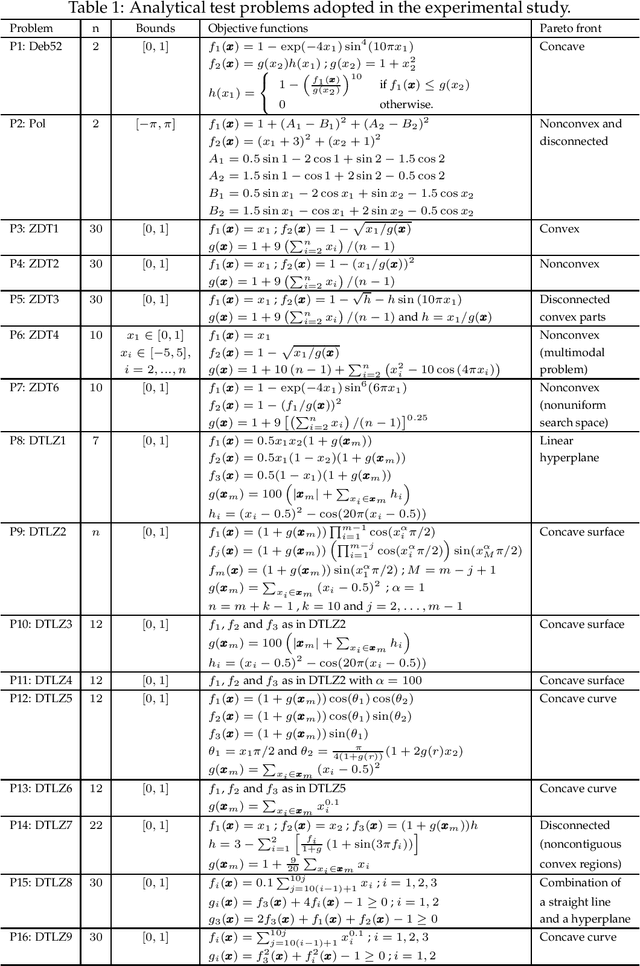
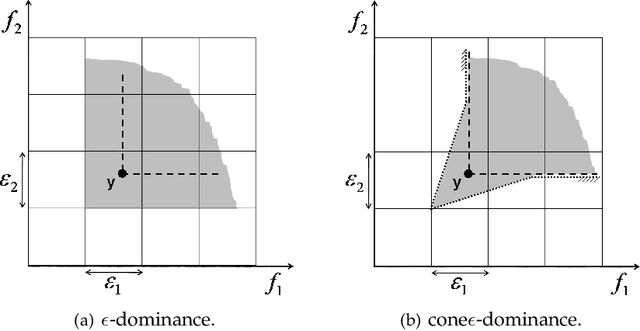

Abstract:We propose the cone epsilon-dominance approach to improve convergence and diversity in multiobjective evolutionary algorithms (MOEAs). A cone-eps-MOEA is presented and compared with MOEAs based on the standard Pareto relation (NSGA-II, NSGA-II*, SPEA2, and a clustered NSGA-II) and on the epsilon-dominance (eps-MOEA). The comparison is performed both in terms of computational complexity and on four performance indicators selected to quantify the quality of the final results obtained by each algorithm: the convergence, diversity, hypervolume, and coverage of many sets metrics. Sixteen well-known benchmark problems are considered in the experimental section, including the ZDT and the DTLZ families. To evaluate the possible differences amongst the algorithms, a carefully designed experiment is performed for the four performance metrics. The results obtained suggest that the cone-eps-MOEA is capable of presenting an efficient and balanced performance over all the performance metrics considered. These results strongly support the conclusion that the cone-eps-MOEA is a competitive approach for obtaining an efficient balance between convergence and diversity to the Pareto front, and as such represents a useful tool for the solution of multiobjective optimization problems.
MOEA/D with Random Partial Update Strategy
Jan 20, 2020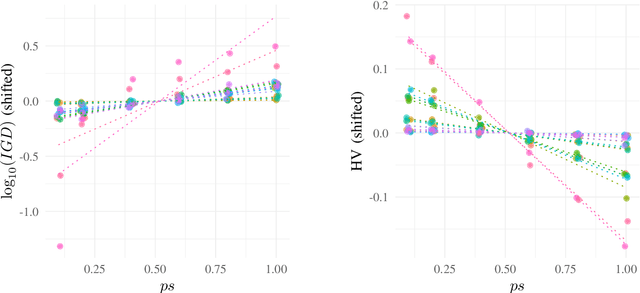
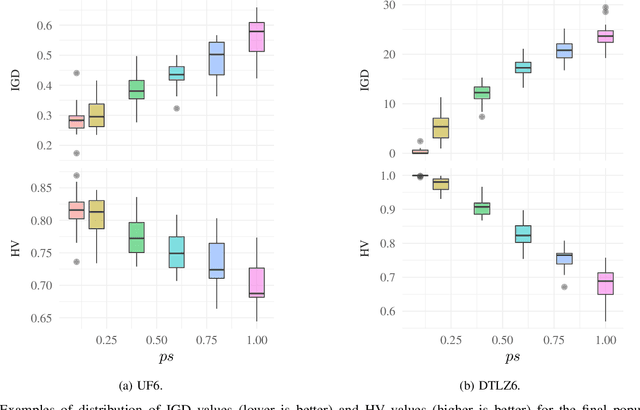
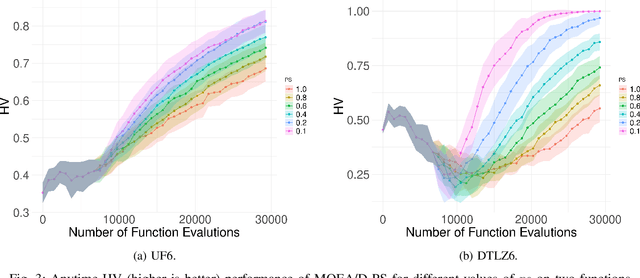
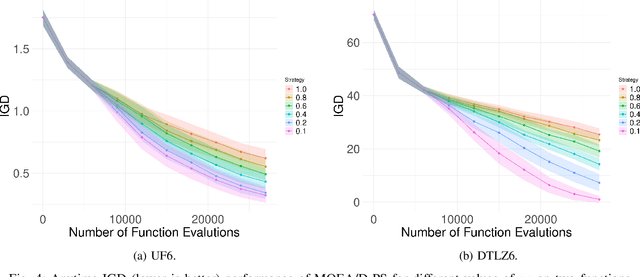
Abstract:Recent studies on resource allocation suggest that some subproblems are more important than others in the context of the MOEA/D, and that focusing on the most relevant ones can consistently improve the performance of that algorithm. These studies share the common characteristic of updating only a fraction of the population at any given iteration of the algorithm. In this work we investigate a new, simpler partial update strategy, in which a random subset of solutions is selected at every iteration. The performance of the MOEA/D using this new resource allocation approach is compared experimentally against that of the standard MOEA/D-DE and the MOEA/D with relative improvement-based resource allocation. The results indicate that using the MOEA/D with this new partial update strategy results in improved HV and IGD values, and a much higher proportion of non-dominated solutions, particularly as the number of updated solutions at every iteration is reduced.
Sample size calculations for the experimental comparison of multiple algorithms on multiple problem instances
Aug 05, 2019
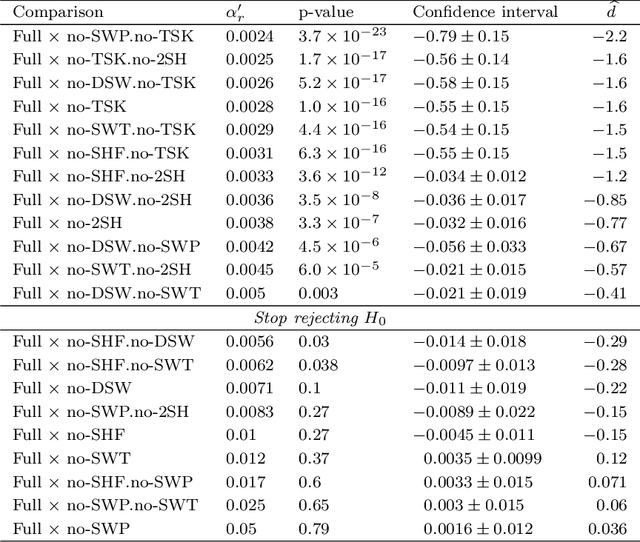
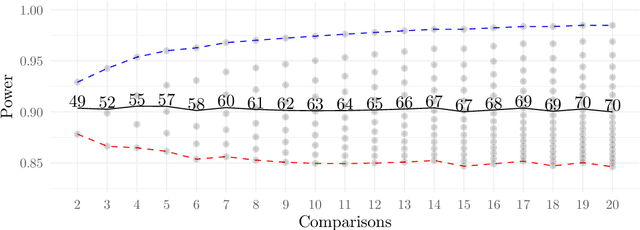

Abstract:This work presents a statistically principled method for estimating the required number of instances in the experimental comparison of multiple algorithms on a given problem class of interest. This approach generalises earlier results by allowing researchers to design experiments based on the desired best, worst, mean or median-case statistical power to detect differences between algorithms larger than a certain threshold. Holm's step-down procedure is used to maintain the overall significance level controlled at desired levels, without resulting in overly conservative experiments. This paper also presents an approach for sampling each algorithm on each instance, based on optimal sample size ratios that minimise the total required number of runs subject to a desired accuracy in the estimation of paired differences. A case study investigating the effect of 21 variants of a custom-tailored Simulated Annealing for a class of scheduling problems is used to illustrate the application of the proposed methods for sample size calculations in the experimental comparison of algorithms.
Sample size estimation for power and accuracy in the experimental comparison of algorithms
Oct 15, 2018



Abstract:Experimental comparisons of performance represent an important aspect of research on optimization algorithms. In this work we present a methodology for defining the required sample sizes for designing experiments with desired statistical properties for the comparison of two methods on a given problem class. The proposed approach allows the experimenter to define desired levels of accuracy for estimates of mean performance differences on individual problem instances, as well as the desired statistical power for comparing mean performances over a problem class of interest. The method calculates the required number of problem instances, and runs the algorithms on each test instance so that the accuracy of the estimated differences in performance is controlled at the predefined level. Two examples illustrate the application of the proposed method, and its ability to achieve the desired statistical properties with a methodologically sound definition of the relevant sample sizes.
Tuning metaheuristics by sequential optimization of regression models
Sep 21, 2018



Abstract:Tuning parameters is an important step for the application of metaheuristics to problem classes of interest. In this work we present a tuning framework based on the sequential optimization of perturbed regression models. Besides providing algorithm configurations with good expected performance, the proposed methodology can also provide insights on the relevance of each parameter and their interactions, as well as models of expected algorithm performance for a given problem class, conditional on the parameter values. A test case is presented for the tuning of six parameters of a decomposition-based multiobjective optimization algorithm, in which an instantiation of the proposed framework is compared against the results obtained by the most recent version the Iterated Racing (Irace) procedure. The results suggest that the proposed approach returns solutions that are as good as those of Irace in terms of mean performance, with the advantage of providing more information on the relevance and effect of each parameter on the expected performance of the algorithm.
The MOEADr Package - A Component-Based Framework for Multiobjective Evolutionary Algorithms Based on Decomposition
Jul 18, 2018


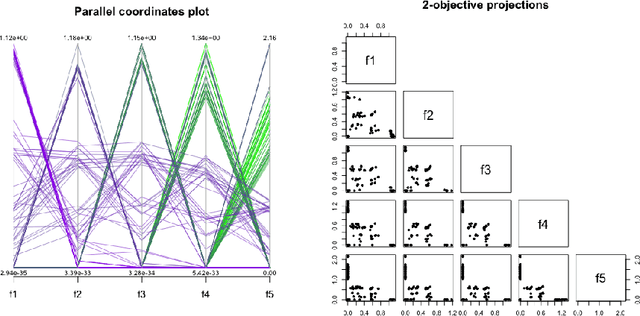
Abstract:Multiobjective Evolutionary Algorithms based on Decomposition (MOEA/D) represent a widely used class of population-based metaheuristics for the solution of multicriteria optimization problems. We introduce the MOEADr package, which offers many of these variants as instantiations of a component-oriented framework. This approach contributes for easier reproducibility of existing MOEA/D variants from the literature, as well as for faster development and testing of new composite algorithms. The package offers an standardized, modular implementation of MOEA/D based on this framework, which was designed aiming at providing researchers and practitioners with a standard way to discuss and express MOEA/D variants. In this paper we introduce the design principles behind the MOEADr package, as well as its current components. Three case studies are provided to illustrate the main aspects of the package.
 Add to Chrome
Add to Chrome Add to Firefox
Add to Firefox Add to Edge
Add to Edge